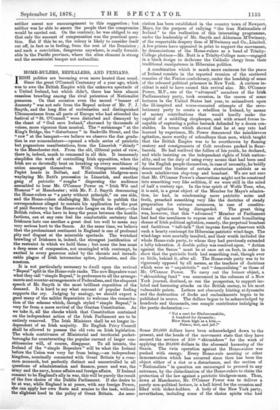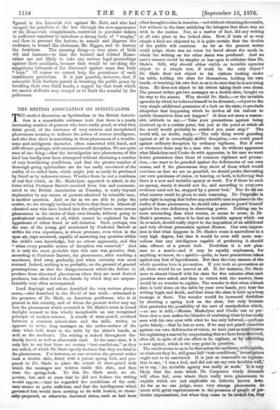HOME-RULERS, REPEALERS, AND FENIANS.
IRISH politics are becoming even more heated than usual. Since the great O'Connell Centenary of a year ago, which was to awe the British Empire with the unknown spectacle of a United Ireland, but which didn't, there has been almost ceaseless brawling among the rival patentees of Nationalist panaceas. On that occasion even the sacred "banner of Amnesty" was not safe from the Repeal ardour of Mr. P. J. Smyth, and the long files of ecclesiastics and distinguished Ultramontanes from all parts of Europe who had attended the festival of "St. O'Connell" were disturbed and dismayed by the chant of "God save Ireland," chorused by thousands of voices, more vigorous than musical. The " scrimmage " at the King's Bridge, the " disturbance " in Sackville Street, and the "row" at the banquet—we believe we observe the due grada- tion in our nomenclature—opened a whole series of patriotic but pugnacious manifestations, from the Limerick " shindy " to the Manchester riot. From the old, illiberal point of view, there is, indeed, much to commend in all this. It immensely simplifies the work of controlling Irish opposition, when the Irish are so devotedly bent on breaking up every semblance of union amongst themselves. With Orangemen smashing Papist heads in Belfast, and Nationalist bludgeon-men waylaying Mr. Butt's procession in Limerick, and another gang of patriotic " roughs " dispersing the audience assembled to hear Mr. O'Connor Power on "Irish Wit and Humour" at Manchester ; with Mr. P. J. Smyth denouncing the Home-rulers as "a party without principle," on one side, and the Home-riders challenging Mr. Smyth to publish the correspondence alleged to contain his application for the post of paid Secretary to the Home-rule League on the other,—the British rulers, who have to keep the peace between the hostile factions, can at any rate feel the comfortable certainty that Irishmen hate one another a great deal too well to mean any very serious hurt to the Saxon. At the same time, we believe that the predominant sentiment in England is one of profound pity and disgust at the miserable spectacle. The wretched brawling of Irishmen is, indeed, the strongest justification of the restraint in which we hold them ; but none the less must a deep sense of compassion, not unmingled with contempt, be excited in every generous mind by the chronic and ineradi- cable plague of Irish internecine spites, jealousies, and dis- sensions.
It is not particularly necessary to dwell upon the revived "Repeal" split in the Home-rule ranks. The new Repealers want what they call "simple Repeal," in preference to all the arrange- ments and counter-arrangements of Federalism, and the eloquent speech of Mr. Smyth is the most brilliant exposition of the demand. It is hard to say what amount of popular feeling supports the cry. Judging by analogy, we should expect a good many of the milder Separatists .to welcome the resuscita- tion of the scheme which, though styled "simple Repeal," is very far from a mere revival of the Grattan Constitution. As we take it, all the checks which that Constitution contained on the independent action of the Irish Parliament are to be entirely removed. The Irish Ministers shall be no longer in- dependent of an Irish majority. No English Privy Council shall be allowed to possess the old veto on Irish legislation. The whole contrivance of Ministerial and territorial pocket- boroughs for counteracting the popular current of larger con- stituencies will, of course, disappear. To all intents, the Ireland of the "simple Repealers " will be what the Ireland before the Union was very far from being,—an independent kingdom, nominally connected with Great Britain by a com- mon monarch, but perfectly distinct and uncontrolled in all questions of administration and finance, peace and war, the army and the navy, home affairs and foreign affairs. If Ireland consent to be England's ally in war, this will be purely the result of the free choice of the Dublin Parliament. If she desire to be at war, while England is at peace, with any foreign Power, she can apply her own fleets and armies to the task, without the slightest heed to the policy of Great Britain. An asso- ciation has been established in the country town of Newport, ;Mayo, for the purpose of rallying "the true Nationalists of Ireland" to the realisation of this interesting programme, ' under the leadership of Mr. Smyth and Alderman M'Swinney, of the respectable drapery firm of M'Swinney and Co., Limited. A few priests have appeared in print to support the movement, by denunciations of the Home-rulers as a band of Trinity- College plotters—Mr. Butt is a Trinity-College man—engaged in a black design to dethrone the Catholic clergy from their traditional omnipotence in Hibernian politics.
A combination which is much more ominous for the peace of Ireland consists in the reported reunion of the scattered remains of the Fenian confederacy, under the headship of some of the released political prisoners in New York. A curious in- cident is said to have caused this revival also. Mr. O'Connor Power, M.P., one of the "advanced" members of the Irish Parliamentary party, took occasion, in the course of some lectures in the United States last year, to animadvert upon the ill-inspired and worse-executed attempts of the revo- lutionary party to create a rebellion in Ireland, by means of money contributions that would hardly make the capital of a middling shopkeeper, and with armed forces in- capable of capturing a police barrack defended by a dozen con- stables. In terms which showed that he at any rate had learned by experience, Mr. Power denounced the mischievous agitation, more worthy of schoolboys than men, which taught that the British Empire was to be overthrown by flaming oratory and consignments of Colt revolvers packed in flour- barrels. He had outlived the follies of his youth, he declared, and while insisting on the independent rights of Irish nation- ality, and on the duty of using every means that had been used by the English people themselves, in case of necessity, he boldly denounced the bluster of certain stentorian patriots as so much mischievous clap-trap and bombast. We are not sure that Mr. O'Connor Power's observations might not be construed into something very like sedition, if we were still in the mind of half a century ago. In the true spirit of Wolfe Tone, who, it is said, is a great object of the Member for Mayo's admira- tion, he had, in condemning mere patriotic noise and froth, preached something very like the doctrine of steady preparation for extreme measures, in case of constitu-
tional agitation being disregarded. The great thing was, however, that this " advanced " Member of Parliament had had the manliness to expose one of the most humiliating shams of Irish political agitation, namely, the perpetual bombast and factitious " tall-talk " that impress foreign observers with such a hearty contempt for Hibernian patriotic wind-bags. The wind-bags were mortally insulted, and their wrath included the whole Home-rule party, to whom they had previously extended a lofty toleration. A double policy was resolved upon. "Action against the Saxon" must be at once set on foot, in order to show that the patriotic froth had something real, though ever so little, behind it, after all. The Home-rule party was to be vigorously opposed by all means, as the teachers of doctrines which were so " unpatriotic " and " demoralising " as those of Mr. O'Connor Power. To carry out the former object, a "skirmishing fund" was announced in the columns of a New York journal, destined, so ran the prospectus, to support iso- lated and harassing attacks on the British enemy, in his most vulnerable points. Letters not obscurely hinting at dynamite and the destruction of docks and embankments began to be published in scores. The dollars began to be acknowledged by hundreds and thousands, one sample contributor indulging in the poetic declaration :—
"Not a cent for Blatherumskite, A hundred for dynamite; Blow them high as a kite,— Palace, fort, and jail!"
Some 20,000 dollars have been acknowledged down to the present, and the heads of the movement state that they have secured the services of 250 " skirmishers " for the work of applying the 20,000 dollars in the aforesaid harassing of the Saxon. The twin operation against the Home-rulers was pushed with energy. Every Home-rule meeting or other demonstration which has occurred since then has been the object either of a riot or a disturbance, and the section of " Nationalists " in question are encouraged to proceed to any extremes, by the disinclination of the Home-rulers to claim the protection of the law against a patriotic bludgeon-man. Thus, down at Manchester, Mr. O'Connor Power was to deliver a purely non-political lecture, in a hall hired for the occasion and filled with ticket-holders. A body of the New York party, nevertheless, including some of the choice spirits who had
figured in the Limerick riot against Mr. Butt, and who had escaped the penalties of the law through the non-appearance of the Home-rule complainants, contrived to purchase tickets in sufficient numbers to introduce a strong body of "roughs," and then to prevent the lecture, to assault and disperse the audience, to wound the chairman, Mr. Biggar, and to destroy
the furniture. The amusing thing—a true piece of Irish wit and humour—is that the bruised and robbed Home- =lore are not likely to take any serious legal proceedings against their assailants, because that would be invoking the sanguinary tribunals of the Sassenach against some fine Irish "boys." Of course we cannot help the prevalence of such considerate patriotism. It is just possible, however, that if miserable Irish factions persist in breaking the public peace by breaking their own thick heads, a regard for that trust which we cannot abdicate may compel us to limit the scandal by the policeman.































 Previous page
Previous page